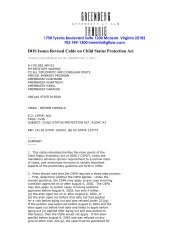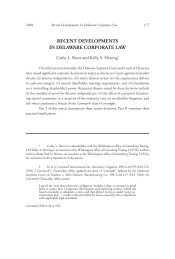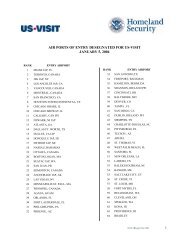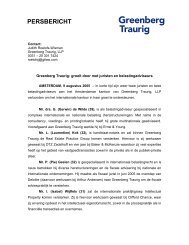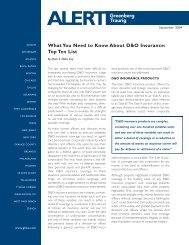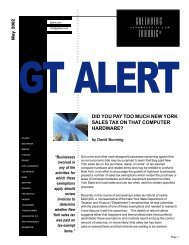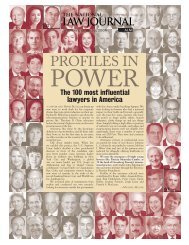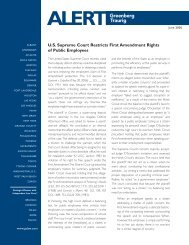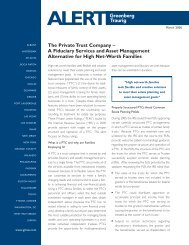The Total Return Swap Business Expands to Bank Loans
The Total Return Swap Business Expands to Bank Loans
The Total Return Swap Business Expands to Bank Loans
You also want an ePaper? Increase the reach of your titles
YUMPU automatically turns print PDFs into web optimized ePapers that Google loves.
and collecting and disbursing dividends received on the s<strong>to</strong>ck. <strong>The</strong> issue was whether the trust wasengaged in a trade or business within the United States so as <strong>to</strong> treat the beneficiary of the trust as soengaged. 27 <strong>The</strong> court stated that those activities do not constitute the conduct of a trade or business “nomatter how large the estate or extended the work.” 28 In contrast <strong>to</strong> those (and other similar) cases, inInverworld Inc. v. Comm’r, a Mexican corporation engaged in the financial services business received clientfunds in the United States, placed those funds with third parties, and executed s<strong>to</strong>ck trades in the UnitedStates on behalf of clients. On those facts, the foreign corporation was considered <strong>to</strong> be engaged in theconduct of a trade or business in the United States.A regulation proposed in 1998 (and still in proposed form as of the date hereof) makes clear that theprinciples of the above cases and the investment safe harbor apply <strong>to</strong> derivative transactions. 29 Thatregulation states that nondealer transactions in derivatives do not constitute the conduct of a trade orbusiness in the United States. Nondealer derivative transactions include interest rate swaps and equityswaps, as well as derivatives in a “note, bond, debenture or other evidence of indebtedness.” 30 A bank loanTRS should be within that definition and, provided that the Hedge Fund is not acting as a derivatives dealers(which is very unlikely), that proposed regulation offers additional support for the conclusion that proprietaryinvestment activities (whether actual or synthetic) are not trade or business activities. In at least one privateletter ruling, the IRS concluded that a taxpayer whose U.S. activities included procuring interest rate swapsas hedges of debt investing was not engaged in the conduct of a trade or business in the United States. 31We have postulated that the Hedge Fund is not engaged in the conduct of a U.S. trade or business byreason of its activities apart from entering in<strong>to</strong> the TRS on the bank loan. <strong>The</strong> swap is a proprietary positionentered in<strong>to</strong> for profit in the same way that any other security transaction would be acquired. Even assumingthat the Hedge Fund is managed and controlled from within the United States by a U.S.-based investmentmanager, 32 the well-established case law briefly described above unambiguously establishes that theacquisition and management of proprietary investment activities within the United States does not rise <strong>to</strong> thelevel of the conduct of a trade or business in the United States. <strong>The</strong> Hedge Fund, in contrast <strong>to</strong> the facts inInverworld, is not acquiring the position in the United States on behalf of another person. Accordingly, it issubstantially unlikely that the swap activities in and of themselves would change this result. Thus, the HedgeFund should not be subject <strong>to</strong> net income taxation by reason of entering in<strong>to</strong> the swap with <strong>Bank</strong> A.B. Source Income TaxationCorporations that earn specified types of income “from sources within the United States” not in connectionwith the conduct of a trade or business within the United States are subject <strong>to</strong> a flat 30 percent withholdingtax. 33 U.S.-source income includes some types of interest 34 and “other fixed or determinable annual orperiodical gains, profits and income” (so- called FDAP income). FDAP income includes “all income includedin gross income under section 61” 35 unless specifically excluded and swap income is not excluded. Apartfrom currency swaps (which are separately sourced), income from a swap generally is sourced “byreference <strong>to</strong> the residence of the taxpayer as determined under section 988(a)(3)(B)(i).” 36 Under that section,a corporation organized under the laws of a country other than the United States is treated as a foreignperson. If a swap is entered in<strong>to</strong> in connection with the conduct of a U.S. trade or business, however, theincome from the swap is treated as U.S.-source and is treated as income that is effectively connected. 37<strong>Swap</strong> income, whether in the form of periodic or nonperiodic payments, is FDAP income under the definitioncontained in applicable Treasury regulations. Income from a bank loan swap, however, should be sourced <strong>to</strong>the residence of the recipient of the income which, in our case, is a non-U.S. person. Accordingly, since asGreenberg Traurig, LLP



